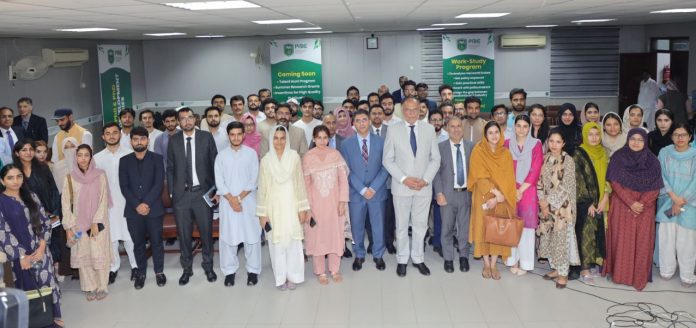ISLAMABAD, SEP 15 (DNA) – The Pakistan Institute of Development Economics (PIDE) celebrated Orientation Day 2025 at its campus in Islamabad, warmly welcoming a new cohort of MPhil and PhD scholars embarking on their academic journey. The event featured orientation sessions, book stalls showcasing PIDE’s extensive research output, documentary screenings, and interactive engagements to familiarize students with academic rules and regulations.
Delivering the keynote address, Federal Minister for Planning, Development & Special Initiatives and Chancellor PIDE, Prof. Ahsan Iqbal Chaudhary (NI), welcomed the new scholars and emphasized that joining PIDE is not merely the start of an academic journey but an opportunity to shape Pakistan’s future through research, innovation, and policy engagement. Unlike other institutions where economics remains confined to classrooms, PIDE uniquely combines teaching with applied research, offering students direct exposure to real-world policymaking as a government think tank. This dual role, he noted, enables PIDE scholars to become problem-solvers whose work is academically rigorous and practically relevant.
Prof. Ahsan Iqbal expressed pride in having contributed to PIDE’s expansion, envisioning it as a hub that nurtures a new generation of economists capable of strengthening the foundations of Pakistan’s progress. Drawing lessons from history, he observed that Pakistan had once been ahead of regional peers through development plans like Vision 2010 and Vision 2025 but faltered due to political instability and inconsistent policies. While countries such as China, Vietnam, and Bangladesh advanced steadily, Pakistan missed key opportunities, resulting in slower industrial growth, stagnant exports, and developmental setbacks. He stressed that Pakistan now stands at a “fourth flight” in its development journey, where success depends on policy stability, continuity, and collective national effort.
Outlining the government’s URAAN Pakistan Program, the Federal Minister said the agenda rests on five strategic pillars: export-led growth to earn vital foreign exchange; technological transformation through digitalization, AI, fintech, and biotechnology; climate and environmental resilience to ensure food and water security; energy and infrastructure reform for affordable, green, and efficient systems; and equity and empowerment through stronger education, health, social protections, and inclusive development. He urged scholars to contribute to these national priorities through their research and innovation.
To guide their academic and professional journeys, Prof. Ahsan Iqbal shared three core principles. First, excellence — mediocrity cannot deliver transformation, so scholars must strive for global standards in their work. Second, relevance — knowledge should not be confined to libraries or journals but must address real national problems and improve lives. Third, resilience — progress demands perseverance and consistency, and setbacks must not weaken resolve.
Urging students to embrace curiosity, challenge assumptions, and commit to nation-building, the Minister described them as the next generation of researchers and policymakers whose intellect, creativity, and dedication will help Pakistan achieve prosperity, stability, and equity.
The program concluded with refreshments, offering students, faculty, and guests an opportunity to interact informally. With this orientation, PIDE reaffirmed its mission to nurture thought leaders, foster innovation, and provide evidence-based solutions to Pakistan’s pressing socio-economic challenges.
Earlier, in his welcome address, Vice Chancellor Dr. Nadeem Javaid (SI) congratulated the newly admitted scholars for securing admission through a highly competitive process, noting that more than 600 applications were received, and after rigorous screening, 110 candidates were selected for the PhD and MPhil programs. He highlighted several structural reforms introduced under his leadership, including the launch of two new PhD programs in Governance & Public Policy and Development Studies aimed at generating locally grounded, evidence-based solutions to pressing national challenges. He explained that course outlines for all programs had been collectively reviewed by the faculty to ensure market-relevant training, while PIDE’s research structure was redefined with the establishment of eight specialized research centers focusing on domains such as industry, trade, digital economy, climate change, agriculture, energy, and macroeconomic policy.
Dr. Javaid also introduced the concept of three-year rolling research plans, aligning individual faculty work with center-level strategies for a cohesive national research agenda. He noted that PIDE’s training mandate had been reshaped through the creation of the Executive Development Center, which will provide capacity-building opportunities to both the public and private sectors. Among the initiatives announced, he highlighted the Work Study Program (WSP), under which PhD scholars are placed in ministries and government departments to gain hands-on policy experience while receiving a monthly stipend of Rs. 80,000. He further shared that upcoming programs such as the Talent Hunt Program, new scholarship schemes, summer research grants, and incentives for quality publications will further empower PIDE scholars. Dr. Javaid emphasized that these reforms are designed to create an inclusive, research-driven environment that enhances academic excellence and strengthens PIDE’s role as Pakistan’s premier policy think tank.
Dr. Karim Khan, Dean Academics, in his introductory remarks shared PIDE’s institutional journey and emphasized the institute’s role as a premier think tank and research hub in Pakistan. He noted that PIDE alumni now hold leading positions in the State Bank of Pakistan, the Ministry of Planning, the Ministry of Finance, and other significant policy institutions.

















